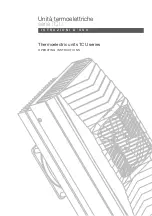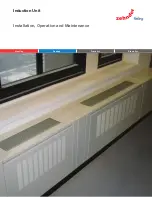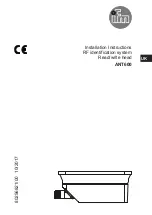
4-4
Maintenance
Section
UL-25/32/40/48 Portable Personnel Lifts
4.2
4.3 Battery Maintenance
(DC units only)
Electrical energy for the motor is supplied by a 12-volt
battery. Proper care and maintenance of the battery and
motor will ensure maximum performance from the lift.
Hazard of explosive gas mixture. Keep
sparks, flame and smoking materials away
from batteries.
Always wear safety glasses when working
with batteries.
Battery fluid is highly corrosive. Rinse away
any spilled fluid thoroughly with clear water.
BATTERY INSPECTION AND
CLEANING
Check battery fluid level daily, especially if work plat-
form is being used in a warm, dry climate. If required,
add distilled water only; use of tap water with high
mineral content will shorten battery life.
If battery water level is not maintained,
battery will not fully charge, creating a low
discharge rate which will damage Motor/
Pump unit and void warranty.
Battery should be inspected periodically for signs of
cracks in the cases, electrolyte leakage and corrosion of
the terminals. Inspect cables for worn spots or breaks in
the insulation and for broken cable terminals.
Clean battery that shows signs of corrosion at the termi-
nals or onto which electrolyte has overflowed during
charging. Use a baking soda solution to clean the
battery, taking care not to get the solution inside the
cells. Rinse thoroughly with clear water. Clean battery
and cable contact surfaces to a bright metal finish
whenever a cable is removed.
BATTERY CHARGING (Figure 4-3)
Charge battery at end of each work shift or sooner if
battery has been discharged.
Charge battery in a well-ventilated area.
Do not charge battery when the lift is in an
area containing sparks or flames.
Permanent damage to battery will result if
battery is not immediately recharged after
discharging.
Never leave charger operating unattended
for more than two days.
Never disconnect cables from battery when
charger is operating.
Keep charger dry.
When night air temperatures fall below 65
°
F (18
°
C) a
battery charged in an unheated area should be placed on
charger as soon after use as possible. Under such condi-
tions a 4 hour equalize charge once a week in the early
afternoon will improve state of charge and battery life.
1. Check battery fluid level. If electrolyte level is lower than
3
/
8
in. (10 mm) above plates add distilled water only.
2. Verify charger voltage switch is set to 12 volts.
3. The battery charger is located at the rear of the mast.
Connect extension cord (12 gauge conductor minimum
and 50 ft. (15 m) in length maximum) to the charger plug.
Connect other end of extension cord to properly
grounded outlet of proper voltage and frequency.
4. Set charger control to "conventional" setting. Charger
ammeter should indicate charge rate.
5. When battery is fully charged, charger automatically
turns itself off. Disconnect extension cord.
4.3
Summary of Contents for ULII-25
Page 1: ......
Page 4: ...Foreword UL 25 32 40 48 Portable Personnel Lifts ii NOTES ...
Page 22: ...Operation 3 12 Section UL 25 32 40 48 Portable Personnel Lifts 3 5 NOTES ...
Page 42: ...5 6 UL 25 32 40 48 Portable Personnel Lifts Troubleshooting Section 5 1 NOTES ...
Page 49: ...Illustrated Parts Breakdown 7 2 Section UL 25 32 40 48 Portable Personnel Lifts 7 3 ...
Page 51: ...Illustrated Parts Breakdown 7 2 Section UL 25 32 40 48 Portable Personnel Lifts 7 5 ...
Page 52: ...Illustrated Parts Breakdown 7 2 Section UL 25 32 40 48 Portable Personnel Lifts 7 6 ...
Page 53: ...Illustrated Parts Breakdown 7 2 Section UL 25 32 40 48 Portable Personnel Lifts 7 7 ...
Page 57: ...Illustrated Parts Breakdown 7 2 Section UL 25 32 40 48 Portable Personnel Lifts 7 11 NOTES ...
Page 59: ...Illustrated Parts Breakdown 7 2 Section UL 25 32 40 48 Portable Personnel Lifts 7 13 ...
Page 61: ...Illustrated Parts Breakdown 7 2 Section UL 25 32 40 48 Portable Personnel Lifts 7 15 ...
Page 63: ...Illustrated Parts Breakdown 7 2 Section UL 25 32 40 48 Portable Personnel Lifts 7 17 ...
Page 65: ...Illustrated Parts Breakdown 7 2 Section UL 25 32 40 48 Portable Personnel Lifts 7 19 ...
Page 67: ...Illustrated Parts Breakdown 7 2 Section UL 25 32 40 48 Portable Personnel Lifts 7 21 ...
Page 69: ...Illustrated Parts Breakdown 7 2 Section UL 25 32 40 48 Portable Personnel Lifts 7 23 ...
Page 75: ...Illustrated Parts Breakdown 7 2 Section UL 25 32 40 48 Portable Personnel Lifts 7 29 NOTES ...
Page 77: ...Illustrated Parts Breakdown 7 2 Section UL 25 32 40 48 Portable Personnel Lifts 7 31 ...
Page 79: ...Illustrated Parts Breakdown 7 2 Section UL 25 32 40 48 Portable Personnel Lifts 7 33 ...
Page 81: ...Illustrated Parts Breakdown 7 2 Section UL 25 32 40 48 Portable Personnel Lifts 7 35 ...
Page 83: ...Illustrated Parts Breakdown 7 2 Section UL 25 32 40 48 Portable Personnel Lifts 7 37 ...
Page 87: ...Illustrated Parts Breakdown 7 2 Section UL 25 32 40 48 Portable Personnel Lifts 7 41 ...
Page 89: ...Illustrated Parts Breakdown 7 2 Section UL 25 32 40 48 Portable Personnel Lifts 7 43 ...
Page 91: ...Illustrated Parts Breakdown 7 2 Section UL 25 32 40 48 Portable Personnel Lifts 7 45 ...
Page 93: ...Illustrated Parts Breakdown 7 2 Section UL 25 32 40 48 Portable Personnel Lifts 7 47 ...
Page 95: ...Illustrated Parts Breakdown 7 2 Section UL 25 32 40 48 Portable Personnel Lifts 7 49 ...
Page 97: ...Illustrated Parts Breakdown 7 2 Section UL 25 32 40 48 Portable Personnel Lifts 7 51 ...
Page 99: ...Illustrated Parts Breakdown 7 2 Section UL 25 32 40 48 Portable Personnel Lifts 7 53 ...
Page 101: ...Illustrated Parts Breakdown 7 2 Section UL 25 32 40 48 Portable Personnel Lifts 7 55 ...
Page 102: ...Illustrated Parts Breakdown 7 2 Section UL 25 32 40 48 Portable Personnel Lifts 7 56 ...
Page 103: ...Illustrated Parts Breakdown 7 2 Section UL 25 32 40 48 Portable Personnel Lifts 7 57 ...
Page 109: ...Illustrated Parts Breakdown 7 2 Section UL 25 32 40 48 Portable Personnel Lifts 7 63 ...
Page 111: ...Illustrated Parts Breakdown 7 2 Section UL 25 32 40 48 Portable Personnel Lifts 7 65 ...
Page 112: ...Illustrated Parts Breakdown 7 2 Section UL 25 32 40 48 Portable Personnel Lifts 7 66 NOTES ...
















































